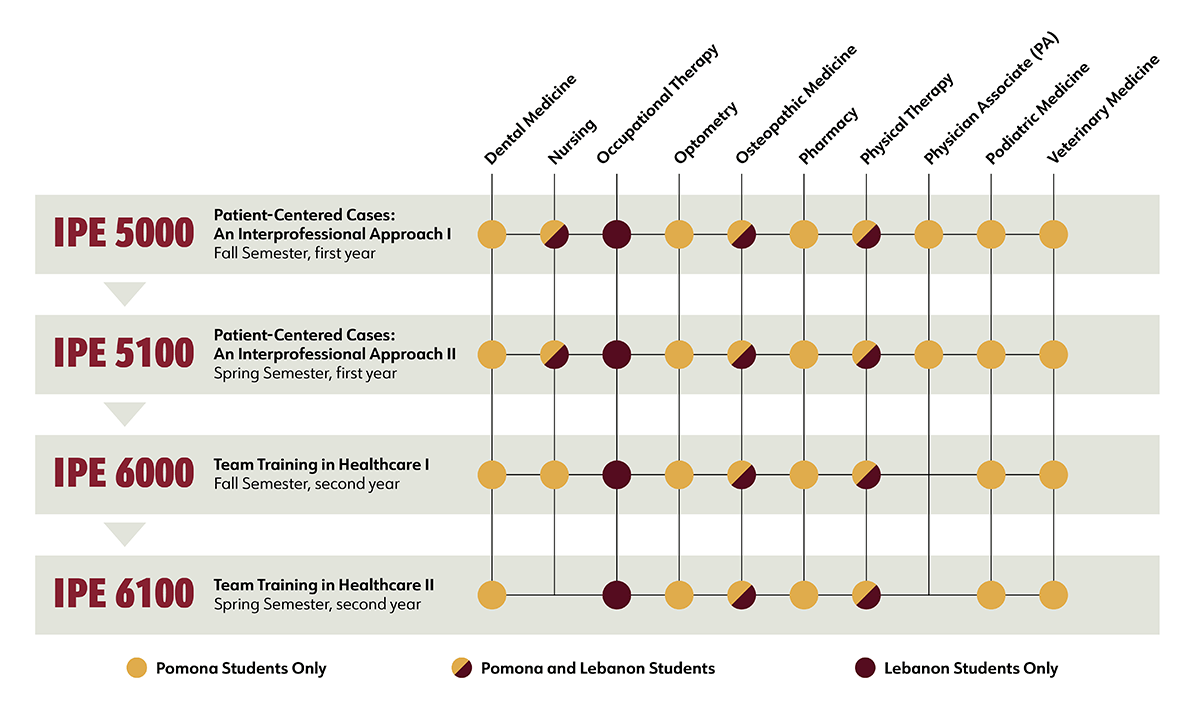
Curriculum
Course Descriptions
IPE 5000 Patient Centered Cases – An Interprofessional Approach I (1.0 credit hour, CR/NCR) This course is a required university seminar for all first-year health professional students. This course prepares students to practice health care services through a team approach. Working in small interprofessional teams, students will explore cases representing conditions across the life span. The cases will integrate elements common to all professionals such as ethical, behavioral, social, and psychological issues. This course is a graduation requirement for all health professional programs.
IPE 5100 Patient Centered Cases – An Interprofessional Approach II (1.0 credit hour, CR/NCR) This course is a continuation of IPE 5000.
IPE 6000 Team Training in Health Care I (1.0 credit hour, CR/NCR) IPE 6000 will continue to build upon the knowledge from the IPE 5000 series but will expand upon that knowledge and require the student to learn and apply advanced tools and strategies that are crucial to develop a collaborative healthcare team. The majority of the course is independent study with students engaging in a large-scale tabletop activity where they apply team tools necessary to solve a healthcare dilemma.
IPE 6100 Team Training in Health Care II (1.0 credit hour, CR/NCR) This course is a continuation of IPE 6000.

The following topics are integrated within each of the courses above.
Health Systems Science (HSS)
The study of how health care is delivered, how health care professionals work together to deliver that care, and how the health system can improve patient care and health care delivery. Along with basic and clinical sciences, HSS is rapidly becoming a crucial “third pillar” of health professions science, with an emphasis on understanding the role of human factors, systems thinking, leadership, and health systems improvement strategies.
Humanism, Diversity, Equity, Inclusion, Anti-Racism, and Anti-Bias
Often throughout the IPE Program a topic is put under one or more of these conceptual lenses during small- or large-group discussion. To provide insights into these topics we have, at various points, worked with members of the following organizations:
- Black Student Union
- Chinese American Health Students Association
- Hawaiian Islands Cultural Club & Filipino American Students Association
- Latino Medical Student Association
- LGBTQ Equality Alliance
- Native American Health Career Ladder
- Student National Dental Association
- Student National Medical Association
- White Coats for Black Lives
The IPE department regularly solicits student feedback and tracks knowledge acquisition both during and at the conclusion of each IPE course for the purpose of assessing curriculum effectiveness and improving IPE curriculum content and delivery. Student feedback is carefully considered together with input from the IPE Design and Implementation teams when making curricular improvements.

